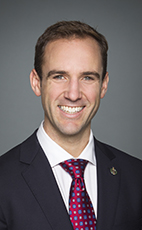Madam Speaker, when the member rose in the House in May, she raised the issue of uncertainty among Canadian businesses and individuals due to the NAFTA negotiations that were ongoing at that time. She need not worry anymore, and I hope she will join me in celebrating the announcement that took place at the beginning of this week that we have a new United States-Mexico-Canada agreement.
The conclusion of this deal will bring certainty and stability that contribute to the continued prosperity of our economy. Not only that, this deal is going to make Canadians' lives better, and it will be profoundly beneficial for our economy, for Canadian families and for the middle class.
The rules of origins for autos are revised to require higher levels of North American content, which will incentivize production and sourcing in North America, plus, we have a new labour value content provision that requires a certain amount of the making of cars to be done by high-paid workers. This is a tangible and real boon to our auto workers and will ensure that Canadian auto production is secure for years to come.
I am glad to hear my colleague across the way laud the provisions that secure good labour standards and good economic opportunities in the auto sector in Canada.
We have also secured an exemption from any future use of Section 232 measures. First, if Section 232 measures are to be implemented against any sector, we will now have 60 days to negotiate a better outcome for Canadians. Second, if there are Section 232 tariffs on autos, we have an exemption for up to 2.6 million vehicles, not including light trucks. For auto parts, that exemption is worth $32.4 billion U.S. These are levels that far exceed current Canadian exports, and they mean security and stability for our auto workers.
It has been especially gratifying to hear from auto workers about this deal and what it means to them. For example, a CBC article from yesterday quoted Lino LoMedico, a team leader at the Chrysler assembly plant in Windsor, saying that Monday “was a new day” for workers.
As we know, the steel and aluminum tariffs from the U.S. remain in place, but our response on that issue is as firm as ever. Our strong dollar-for-dollar retaliation measures against the U.S. remain in force. We put them in place because we have to stand up for our workers and we have to defend our economy. Actions that threaten our prosperity cannot, and under this government will not, go unmet.
We are providing help and support to businesses and workers affected by tariffs, including by making up to $2 billion available to defend and protect their interests.
As our negotiation of the USMCA shows, our government is there for Canadians. We know that their jobs, their retirement savings, their investments and their well-being depend on their government fighting for their interests, and that is exactly what we have done.

